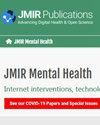针对自杀意念的自我指导应用程序 BrighterSide 的功效:随机对照试验
IF 4.8
2区 医学
Q1 PSYCHIATRY
引用次数: 0
摘要
背景:虽然经过严格评估的针对自杀倾向的智能手机应用程序相对较少,但自我指导的数字干预措施可以降低自杀倾向的严重程度。试验目的本试验评估了 BrighterSide® 智能手机应用干预在降低自杀意念严重程度方面是否优于候补对照组。方法:从澳大利亚社区招募了 550 名年龄在 18-65 岁、近期有自杀倾向的成年人。在这项随机对照试验中,参与者被随机分配到接受BrighterSide®干预应用程序或等待名单对照组(包括照常治疗)。该应用程序是自助式的,参与者可以在研究期间按照自己的节奏使用该应用程序。在基线、6 周和 12 周时收集自我报告。主要结果是自杀意念的严重程度和频率,次要结果包括心理困扰、功能和恢复。此外,还收集了有关应用程序参与度和参与者反馈的其他数据。研究结果随着时间的推移,所有参与者的自杀意念都有所减少,但组别与时间之间没有显著的交互作用。自残、功能和恢复、脱离角色天数以及应对能力也有类似的改善。在 6 周的随访中,干预组的心理困扰明显减少,但这一情况在 12 周时没有得到维持。结论与候补对照组相比,BrighterSide® 应用程序并未显著改善自杀意念。本文讨论了这一无效结果的可能原因。临床试验:澳大利亚-新西兰临床试验登记处(ACTRN12621000712808)。本文章由计算机程序翻译,如有差异,请以英文原文为准。
Efficacy of BrighterSide, a Self-Guided App for Suicidal Ideation: Randomized Controlled Trial
Background: Self-guided digital interventions can reduce the severity of suicidal ideation, although there remain relatively few, rigorously evaluated, smartphone apps targeting suicidality. Objective: This trial evaluated whether the BrighterSide® smartphone app intervention was superior to a waitlist control group at reducing the severity of suicidal ideation. Methods: 550 adults aged 18-65 with recent suicidal ideation were recruited from the Australian community. In this randomized controlled trial, participants were randomly assigned to receive either the BrighterSide® intervention app, or to a waitlist control group which involved treatment as usual. The app was self-guided, and participants could use the app at their own pace for the duration of the study period. Self-report measures were collected at baseline, 6-weeks, and 12-weeks. The primary outcome was severity and frequency of suicidal ideation, and secondary outcomes included psychological distress and functioning and recovery. Additional data were collected on app engagement and participant feedback. Results: Suicidal ideation reduced over time for all participants, but there was no significant interaction between group and time. Similar improvements were observed for self-harm, functioning and recovery, days out of role, and coping. Psychological distress was significantly lower in the intervention group at the 6-week follow-up, but this was not maintained at 12 weeks. Conclusions: The BrighterSide® app did not lead to a significant improvement in suicidal ideation, relative to a waitlist control group. Possible reasons for this null finding are discussed. Clinical Trial: Australian New Zealand Clinical Trials Registry (ACTRN12621000712808).
求助全文
通过发布文献求助,成功后即可免费获取论文全文。
去求助
来源期刊

Jmir Mental Health
Medicine-Psychiatry and Mental Health
CiteScore
10.80
自引率
3.80%
发文量
104
审稿时长
16 weeks
期刊介绍:
JMIR Mental Health (JMH, ISSN 2368-7959) is a PubMed-indexed, peer-reviewed sister journal of JMIR, the leading eHealth journal (Impact Factor 2016: 5.175).
JMIR Mental Health focusses on digital health and Internet interventions, technologies and electronic innovations (software and hardware) for mental health, addictions, online counselling and behaviour change. This includes formative evaluation and system descriptions, theoretical papers, review papers, viewpoint/vision papers, and rigorous evaluations.
 求助内容:
求助内容: 应助结果提醒方式:
应助结果提醒方式:


